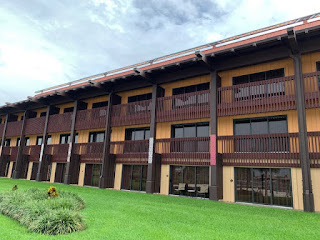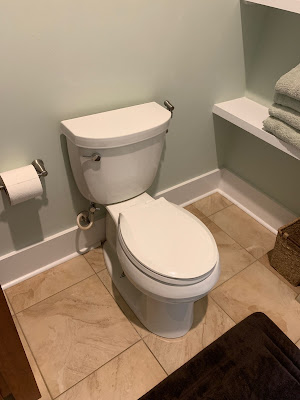 |
| The gate to the empty Magic Kingdom |
It has been one strange summer. Due to the covid virus we have remained sequestered in Tallahassee. It has been very hot and humid. Usually we have been spending summer elsewhere - in London or the rest of Europe. Not this year - since Americans are banned in many places. This is the first summer in years that we stayed home. Our only trip was taking the camper back to Tamaqua PA and sleeping in Lulu's old homestead driveway.
On Friday - Lulu got online and booked two nights in the Fort Wilderness campground at Disneyworld. We packed the camper and at 9AM Saturday we pulled out of Tallahassee. The camper is our little covid cocoon. We sleep - eat - and bath in there. The only virus we can catch in there is from each other.
It is 270 miles from our home to Disneyworld - and we can almost make the entire round trip on one tank of gasoline. Since the weather forecast predicted rain all weekend - we stopped at a Bass Pro Shop in Gainesville and bought 2 ponchos. We topped up with gasoline - and that assured us we had fuel for the trip home.
We arrived at Fort Wilderness in Disneyworld - and were greeted at the entrance booth by a masked man behind a shield. We said our names - and were waved right through to our campsite - 336 Cypress Knee Loop. Since rain was predicted for later - we took the folding bikes off the rack and rode around the resort. Due to covid or construction - we were no longer able to ride over to the Wilderness Lodge and other resort hotels. We did visit the pool and other old haunts we remembered from when we used to bring the kids here.
 |
| Our Roadtrek at Fort Wilderness |
The place was empty by Disney standards. Yes - there were very many large luxurious campers and motor homes - but not a lot of people. I am guessing most of them were in the amusement parks. There were many more golf carts around than we remember. Our little bikes were nice for getting around. Saturday night - Lulu made supper on the charcoal grill. We ate outside before the rain started.
It rained all Saturday night and Sunday night. Sometimes we slept with the AC on when it got humid - other times we turned the AC off and enjoyed the open windows. Lots of little Cypress sprigs were falling all over the camper. I was able to hose them off before we left.
Sunday we had light rain most of the day. We took the bus and boat over to the other resort hotels. Wilderness Lodge - Contemporary Resort - Polynesian Village - and the Grand Floridian all seemed nearly empty. We were allowed to roam freely through the hotels - but each time you came and went - they took your temperature. Masks were mandatory - and everyone wore them. There were plenty of workers wiping down surfaces. There were plenty of sneeze barriers around. On the monorail - each group had their own compartment - it reminded me of the old English trains - you had your own door.
 |
| The beautiful lobby at the Grand Floridian |
We went to the main gate of the Magic Kingdom. For years we paraded through that area with groups of students - and our own kids. It was so quiet - you could look into the park and see very few people on the main street. It was raining mildly and we chose to NOT go into the parks. We did enjoy the shops in the hotels because they were empty.
Lulu made all our meals except one. On Sunday night - we had supper in the Grand Floridian. We found a nice restaurant that was virtually empty. I had chicken and Lulu had salmon in a beautiful dining room - with big windows - but we had it to ourselves. All of the hosts at Disney seemed even nicer than normal. Maybe with the layoffs - they kept the really good ones on the job.
 |
| The monorail - we had our own compartment |
They are housing the NBA at the Grand Floridian - they are sequestered - and we did not see any players.
All the Disney hotels are still very beautiful. Prices were high - starting near $500 a night. We thought our campground price at $95 was high - but I doubt we will ever stay at the hotel at that price. Our $95 price was discounted for being Florida residents.
It was getting late Sunday night - around 8 PM - it was raining - so we decided to NOT visit Disney Springs - the shopping area. We did not want to tempt fate after doing such a good job staying away from people - and wearing our masks. We have been there several time before.
We spent $200 for campground - $50 for gasoline - $50 for supper at Disney. Not bad for 3 days in Disney.
Monday morning we got up - had breakfast - got showers - and headed home. The best weather we had was Monday driving home - mild weather - no rain. We only stopped once the whole way home to change drivers. We were home by 4 PM. If the weather was nicer - we may have stayed a day longer. But honestly - the strange feeling at Disney - few people - the covid precautions - and the memories of previous trips - said it was time to go home.
 |
| Swimming at the Polynesian Village |
I read about a new term called TRAVEL SHAMING. It is when people shun you because you go traveling during a pandemic. Also MASK SHAMING - where people insult you if you even drop your mask for a second to communicate or eat. Everyone has become an expert on what is right and wrong. Some people may even think something like - I hope he gets covid. He deserves it. This virus has changed all of us.
We miss the nice hotels and flying all over the world by jet in Lulu's job. I seldom eat in fancy restaurants but I still love a meat and potatoes barbecue joint or some good pizza or pasta. My kingdom for a pub. We all would be much slimmer if we avoided too many dining out meals. But it is certainly fun sampling foods all over the world.
We are lucky to have our little camper van that lets us travel in relative safety. I love the meals that Lulu makes for us on the road. We all hope for a vaccine to help things back to normal.
 |
| Wild turkeys at our campsite |
 |
| Our folding bikes are 10 years old. |
 |
| Wilderness Lodge was beautiful but empty |
 |
| Lulu found this lovely library table |
 |
| These cabins at Wilderness Lodge look like our old house |
 |
| The Grand Canyon Room at the Contemporary still is awesome |
 |
| We love Dole whip - a Hawaiian Pineapple ice cream treat |
 |
| Polynesian empty rooms |
 |
| Little Bora Bora cottages |
 |
| The water was warm and wonderful - Polynesian hotel |
 |
| Polynesian Lobby - a ghost town |
 |
| Aloha - no one getting Leis |
 |
| Dresses were discounted at the Grand Floridian |
 |
| Our dining room for supper Sunday - the Grand Floridian. |













